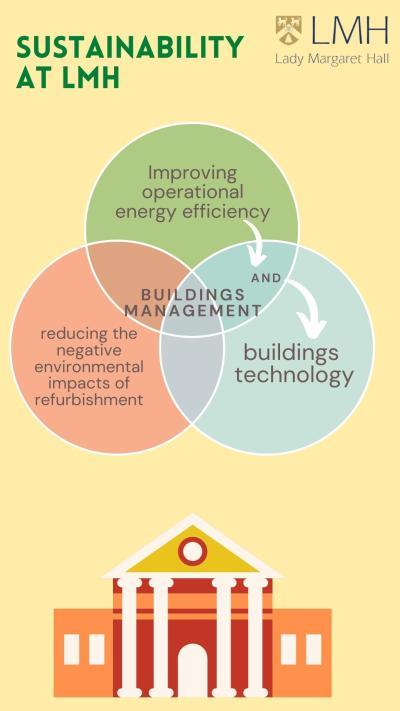
Buildings Management
We plan to reduce the negative environmental impacts of our construction and refurbishment projects by introducing sustainable operating efficiencies and new buildings technology.
Our key goals are:
- To make sure our existing buildings are able to support our other sustainability and educational strategies
- To reduce the lifetime impact of the materials we use to maintain and improve our buildings
- To make our buildings more efficient to use
- To work with suppliers and contractors who have the same aims as us
We have designed a pilot project using our Eleanor Lodge building - a residential block over 100 years old - to see what kind of technologies and interventions will significantly reduce the energy use of such a building. With the help of government funding we hope to deliver that project in 2022 and use what we learn to inform the rest of our future estates plan.
Working with consultants on this project we will also learn more about the embedded carbon in our chosen materials which will help us design better refurbishments in the future.
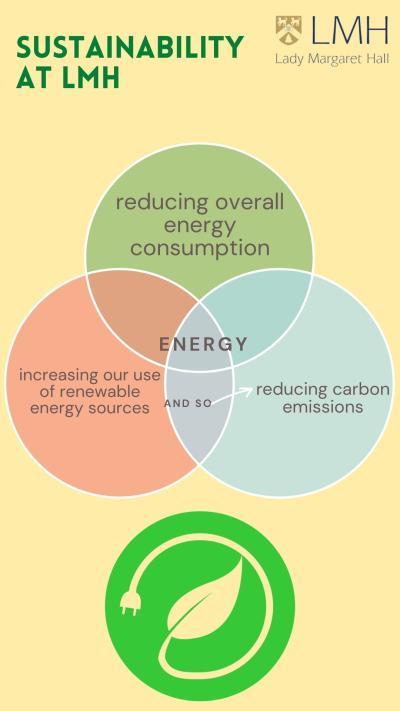
Energy
We plan to reduce overall energy consumption by the College and increase our use of renewable energy sources leading to much lower carbon emissions. We will have to use some technical solutions but also drive some behaviour change to achieve these goals.
We cannot control but we hope to influence our students and staff’s behaviour too.
Our key goals are:
- To reduce the overall energy used in the college’s activities.
- To increase renewable energy as a proportion of the energy we use
- To influence our students and staff to do the same
Our target is to reduce the energy consumed on our main site by college and students to 4,000 MWh or less by 2040. At that point we can consider the scope for future reductions and potentially off setting for our residual consumption.
The main ways that we hope to be able to do this are by insulation of older buildings (tested by the first stage in our Buildings Management strand), by implementing better and more local heating control mechanisms, procuring more efficient plant, better measurement and better data and by using information and influencing campaigns.
We’ve started work on all of these plans but they will take time, and considerable financial input.
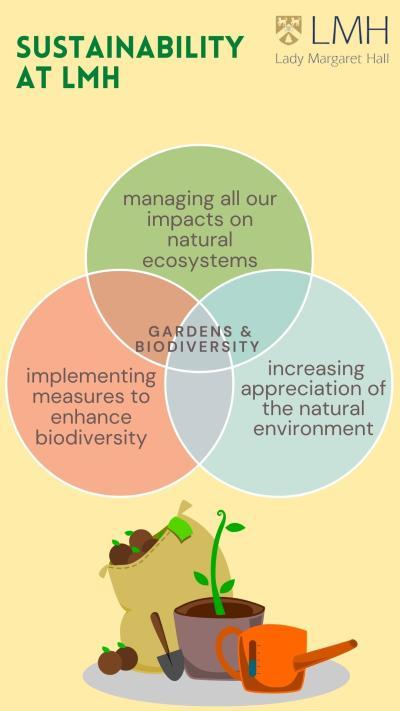
Gardens and Biodiversity
We plan to limit our negative impacts on natural ecosystems and environments within the College site, implementing measures to enhance biodiversity and increasing appreciation of the natural environment.
Our key goals are to
- Increase biodiversity on the college site
- Increase engagement and appreciation of the natural environment within our community
- Begin to measure and manage our indirect impact on biodiversity through activities such as purchasing and travel
Our gardens team and Gardens Committee lead the way in stewarding our grounds in less impactful ways and creating new habitats. There is evidence of their work on this all over the gardens as well as below the surface!
Our Estates development plan including a new punt house and better use of the Talbot basement which opens onto the gardens are major steps towards making more use of the gardens but our Green Impact teams have also prioritised gardens events and student gardening in recent years.
We have engaged with other colleges in some elementary baseline auditing of the college site to help us understand our current site biodiversity. We will continue with this and evolve useful ways to set targets and monitor our progress on biodiversity.
We will repeat student and staff surveys to measure engagement.
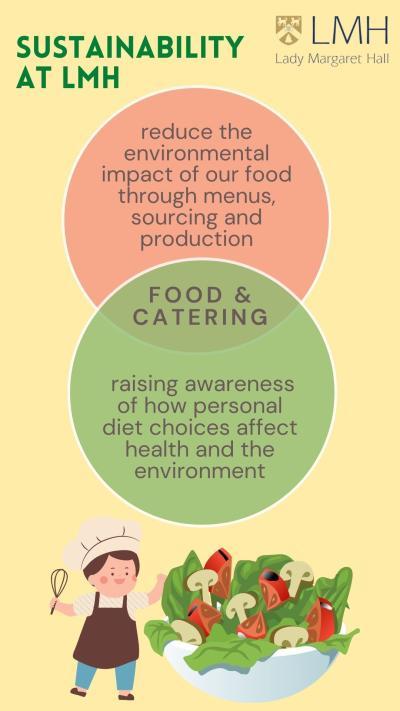
Food and Catering
We plan to reduce the environmental impact of our food (land use, water use, carbon and waste) through adapting menus, sourcing and production and by raising awareness of how personal diet choices affect health and the environment.
Our goals are to
- Reduce the carbon impact of the food we serve
- Reduce the biodiversity impact of the food we serve
while still providing attractive and nutritious, enjoyable and supportive catering services for our students, staff and guests.
Our targets are to halve carbon emissions, estimated land use and biodiversity impact on our 2019 baseline by 2035.
The main ways we think we will be able to achieve this are by adjusting our menus – there is already a very strong demand for lower impact meals from our student body at LMH – reviewing the products we buy and making informed changes where appropriate, working with suppliers who are aligned with our vision, and consistently communicating with diners about what we are offering, its provenance and why we have made the choices we have.
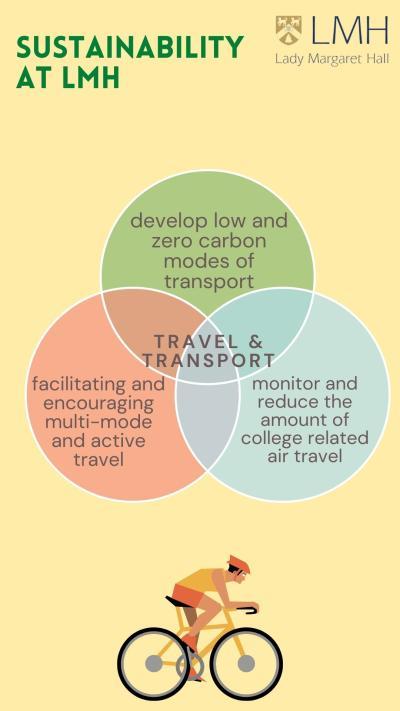
Travel and transport
We aim to encourage and support staff, students and visitors to use low and zero carbon modes of transport for business and commuting, facilitating and encouraging multi-mode and active travel specifically.
Our goals are to
- Increase the number of active and shared journeys to and from the college and on college business
- Reduce the impact of car travel associated with the college
- Reduce the amount of air travel to and from the college and on college business
Although the college does not have much direct business travel it influences a great deal of movements from student commuting, to research trips and goods deliveries to site. We aim to cut direct college business air miles by more than half over pre pandemic levels, decrease car commuting for staff by 25% and servicing and delivery vehicle movements by 50% before 2030. We recognise that much of this is not within our direct control but by choosing policies and partners carefully, and establishing good data through site, staff and student surveys we believe we can make progress.
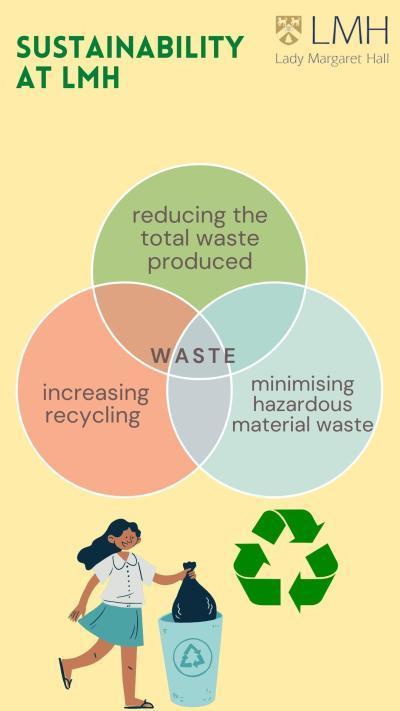
Waste
We aim to reduce total waste produced by the college, increase recycling within our reduced residual waste and minimising hazardous material waste. To achieve this we will need to examine our activities, potentially work in different ways, procure new products, work with new suppliers aligned to our vision and communicate consistently with our staff and students.
We hope that we can also influence the same kinds of behaviour change in our students over time.
Our goals are to
- Reduce the tonnes of waste leaving the site by 50% between 2019 and 2025
- Decrease the non recycled waste from 40% by weight in 2019 to < 20% by weight in 2025
- At the moment these targets amalgamate college business and student residential domestic waste
Waste is a key area of activity for the college not because the processing or transportation of waste creates a large part of carbon or biodiversity impacts in itself but because it is present and tangible to everyone in the college community every day. Working towards these targets will require all of the community to work together and each of the community to consider how they need to change what they do. We are very pleased that our student representatives are so engaged with the topic.
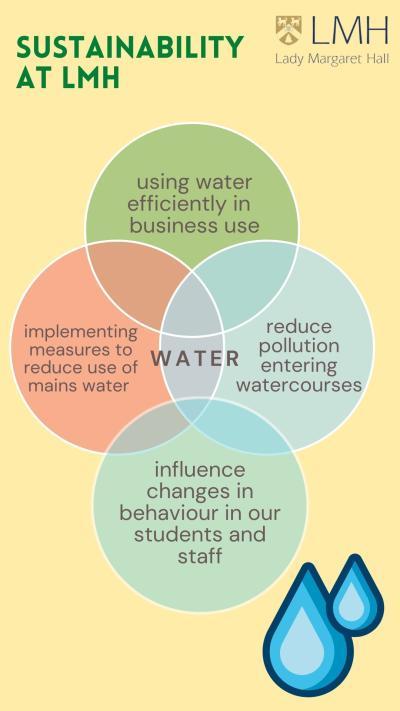
Water
We aim to use water efficiently in buildings and for our business use, implementing measures to reduce the use of mains water. We will minimise and then eliminate pollution entering watercourses.
We hope that we can also influence the same kinds of behaviour change in our students over time.
Our goals are to
- Reduce the cubic meters of mains water that are used in the college year on year
- Introduce run off monitoring to better protect the river that borders our grounds
- At the moment these targets amalgamate college business and student residential water use.
Current water use at LMH is in the region of 25,000 – 30,000 cubic meters per student resident. Our ambition is to be able to use technology and engagement to reduce that year on year at least in line with DEFRA targets when they are published.
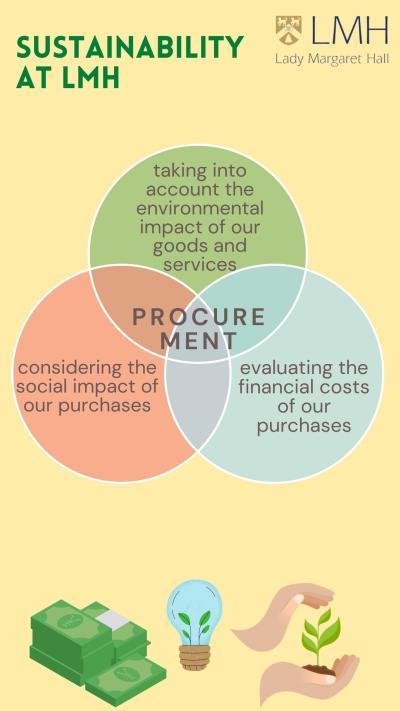
Procurement
We aim to develop information about the environmental and social costs of the goods and services we procure and then to take that into account as well as the financial cost when making college purchasing decisions.
Our goals are to
- Estimate the CO2e emissions in the most significant areas of our supply chain of goods and services
- Estimate the biodiversity impact of our most significant areas of our supply chain of goods and services – (we already have a separate goal for a food procurement)
- Develop priorities for the social impact of our procurement decisions
This work is still in it’s early stages and will take some time to evolve. We are committed to working with other colleges and third parties to best understand our impact allow us to make better business decisions in the future.